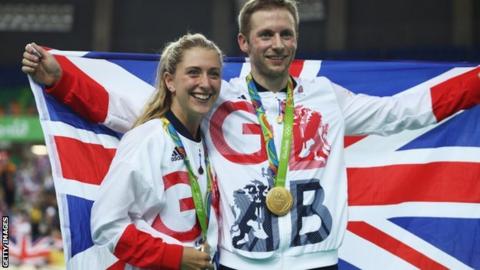
Ambassadors, you are spoiling us.
Once again, it has been a summer when Britain’s sporting stars have done so much to delight. In Rio, second place in the medal table, 20 years after the Atlanta Olympics saw the nation finish 36th.
British athletes won 67 medals, more even than that giddy red, white and blue whirlwind in London four years ago.
They won gold medals in 15 different sports, a wider spread than any other nation – sitting-down sports, as the old gag goes, but also face down in watersports, fighting sports, multi-sports and running sports. On horseback, on wheels, off springboards and on pommels.
It has been a fortnight awash with not only first places but historical firsts. Never before has a Briton won a diving gold. Never before has a Briton won a gymnastics gold. Never before has any triathlete from anywhere retained an Olympic title.
Such is the unprecedented nature of so much of it, the merely dramatic barely gets a look-in. Adam Peaty became the first British male to win a swimming gold in 28 years, but when Max Whitlock and the pairing of Jack Laugher and Chris Mears are breaking hoodoos that have stretched back 130 years, the comparison is rendered unfair.
This has been an Olympics when the cottage in Cheshire belonging to soon-to-be-married couple Laura Trott and Jason Kenny would have sat 13th in the medal table on its own in the aftermath of their spectacular deeds in the velodrome, above Spain, Jamaica, Kenya and Brazil.
It has been a Games when a 58-year-old horse rider has won a gold, and a 16-year-old gymnast become a medallist.
When Amy Tinkler was born, Nick Skelton was six months from retirement. Here he became his country’s oldest Olympic gold medallist since 61-year-old Jerry Millner 108 years ago, at an Olympics Tinkler probably thinks he can remember first hand.
With the freakish deeds came freakish stats; Skelton’s triumph in the individual show jumping meant Britain’s 57th medal had been won by a man born in 1957. With freakish stats came exceptional events: a penalty shootout was won, by the GB women’s hockey team, when penalty shootouts are supposed to end only in tearful defeat.
There were new heroes to salute: goalkeeper Maddie Hinch, kayak single 200m sprint king Liam Heath, sailor Giles Scott. There were old favourites to hail once again: Andy Murray, Charlotte Dujardin, Mo Farah.
And that is only the Olympics, and a partial retelling of it too.
Murray won a second Wimbledon men’s singles title that was ultimately almost more comfortable than it was nerve-wracking. Danny Willett became the first Briton to win the Masters in 20 years.
And there are still four more months to come, weeks that will bring the Paralympics, a chance for the European team to hold the Ryder Cup for the ninth time in 11 stagings.
What sets these achievements apart is the effect they have on the nation. England rugby’s first Grand Slam in 21 years and a clean sweep in the three-match away series in Australia were pleasures almost exclusively for the English. So too Northern Ireland’s efforts in getting to the knockout stages of Euro 2016, or Wales’ remarkable march to the semi-finals.
This is an unparalleled era to be competing under the Union flag.
A few years ago we had the miracle of a first male Wimbledon champion in 77 years, the rediscovery of the great lost ark of British sport. There was a first British Tour de France champion. Last year, Murray and his team-mates won the Davis Cup for the first time since tennis was played in slacks, Brylcreem and cable-knit pullovers.
That seemed quite enough. But we have moved on now to the age of multiples: Lewis Hamilton closing in on his third Formula One title in a row, Chris Froome winning his third Tour de France in four years, Nicola Adams – the first woman in history to win an Olympic boxing gold – becoming the first to retain one too.
There isn’t much left except the America’s Cup, and Sir Ben Ainslie is assembling a unit to have a crack at that too.
English football continues to fail on the international stage, but that has been happening for years, and may continue to happen for years to come. It sits in a cursed category of its own, so awash with money at club level that it can afford to price good but not great players at £50m but unable, amidst all the mercantile success, to produce home-grown talent to compete with even the supposed minnows.
The only fear is the country might somehow start taking it all for granted.
Thirty-sixth in the medal table in 1996, 10th in Sydney 2000 and again in Athens, fourth to wild celebration in Beijing 2008, third in London, second here in Rio. At some stage it will stop being such a surprise, even though the lessons of the lean years that preceded this golden run suggest it should not.
There was a time when sports fans could name all the British gold medallists at an Olympics. A two-year-old child could have done so for Atlanta, since ‘Redgrave and Pinsent’ are hardly the most testing words to recall.
Now? Lots would get most, but only a few would get the full set.
So it is with the honours governments may dish out. Kenny can have six golds in his sock drawer and not be certain of a knighthood. Farah has won nine global track titles in a row and is not yet a sir.
Sports Personality of the Year? Good luck with whittling it down to the traditional shortlist of 10, let alone choosing your winner. A special time, at least until the next Olympic cycle tops it again.



